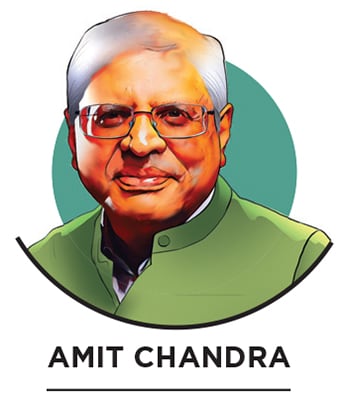
Will Indian innovation evolve in 2022? Amit Chandra asks and answers
A surge in capital, digitally connected customers, and talent are converging to boost entrepreneurship and innovation in India. The inherent human force to innovate amid unprecedented challenges, will propel us forward as a nation, chairperson, Bain Capital Advisors India writes
 Several factors have converged to boost this surge in entrepreneurship and innovation
Several factors have converged to boost this surge in entrepreneurship and innovation
Image: Shutterstock; Portrait: Sameer Pawar
 There has never been a better time to be an entrepreneur in India than today. Just six years ago, we had two unicorns; today we have 79! Nearly half of these have been created in just over a year, signalling a massive momentum in our innovation journey through entrepreneurship. As per Invest India, our ecosystem has seen an exponential growth in these six years, with a nine-fold increase in the number of investors and a seven-fold increase in the number of registered startups, which now stands at over 59,000.
There has never been a better time to be an entrepreneur in India than today. Just six years ago, we had two unicorns; today we have 79! Nearly half of these have been created in just over a year, signalling a massive momentum in our innovation journey through entrepreneurship. As per Invest India, our ecosystem has seen an exponential growth in these six years, with a nine-fold increase in the number of investors and a seven-fold increase in the number of registered startups, which now stands at over 59,000.
In the past few years, we have witnessed a material disruption of processes, networks, thinking, how capital is provided, and other ways of doing business that would normally take decades to replicate. The pandemic and lockdown brought a slew of entirely new innovations in a matter of months, reframing the way we conduct business and changing the way we live. From promoting hybrid working models to cracking digital tools to deliver what was only possible physically earlier, we have seen remarkable innovations in spheres as diverse as health care, education, supply chain, consumer needs, financial services, be it for profit or to meet societal objectives.
Several factors have converged to boost this surge in entrepreneurship and innovation. Fuelled by a surge of capital, enabled by a digitally connected consumer, and powered by talent, a plethora of startups are serving the always-on economy. They are becoming increasingly sophisticated, with many of them making rapid technological advancements in artificial intelligence (AI), Internet of Things (IoT), location data, often breaking new thresholds of geographic and linguistic barriers.









